In the world of flooring, there’s a constant influx of new materials and technologies vying for consumer attention. One such innovation that has garnered significant interest is Stone Plastic Composite (SPC) flooring, with Gaia being one of the leading brands in the market.
In this comprehensive review, we’ll explore the pros and cons of Gaia SPC Flooring, and address some frequently asked questions to help you make an informed decision.
A Brief Overview of Gaia SPC Flooring
Gaia SPC Flooring is a popular choice among homeowners and designers alike due to its unique combination of durability, affordability, and style. Made from a blend of limestone powder, polyvinyl chloride (PVC), and stabilizers, Gaia SPC flooring is designed to withstand the rigors of daily life without sacrificing visual appeal.
Now, let’s dive into the pros and cons of this innovative flooring option to see if it’s the right fit for your home or commercial space.
The Pros of Gaia SPC Flooring
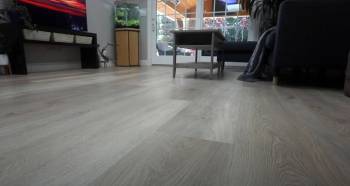
Exceptional Durability
One of the most significant advantages of Gaia SPC flooring is its exceptional durability. The combination of limestone powder and PVC creates a rigid core, making the flooring resistant to dents, scratches, and wear. This makes it an excellent choice for high-traffic areas or homes with pets.
Waterproof and Easy to Clean
Gaia SPC flooring is 100% waterproof, which means it can be installed in moisture-prone areas like kitchens, bathrooms, and basements without the risk of water damage. Additionally, its waterproof nature makes it a breeze to clean – just wipe up spills and mop as needed.
Easy Installation
Gaia SPC flooring features a click-lock system, which makes installation a DIY-friendly process. The planks can be easily cut to size and installed without the need for adhesives, making it a quick and hassle-free option for both professionals and homeowners.
Wide Variety of Styles
Gaia offers an extensive range of styles and designs to suit any taste. From realistic wood and stone looks to more contemporary designs, there’s a Gaia SPC flooring option to match every aesthetic.
The Cons of Gaia SPC Flooring
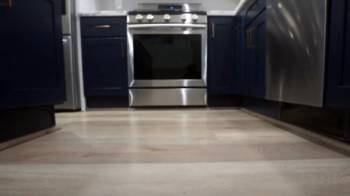
Less Comfortable Underfoot
While Gaia SPC flooring is incredibly durable, its rigid core can make it less comfortable underfoot than softer flooring options like carpet or cork. Some users may find it too hard for their liking, particularly in areas where they stand for extended periods.
Sensitive to UV Light
SPC flooring, including Gaia, is sensitive to UV light exposure, which can cause fading or discoloration over time. It’s essential to use window treatments or UV-blocking window films to minimize this issue.
Not Biodegradable
Gaia SPC flooring contains PVC, which means it’s not biodegradable and may not be the most eco-friendly choice. However, some Gaia SPC flooring products are made from recycled materials, which can help mitigate this concern.
FAQ
While Gaia is a reputable and popular SPC flooring brand, there are many other high-quality options on the market. The best SPC flooring brand for you will depend on your budget, style preferences, and specific needs.
Some disadvantages of SPC flooring include its sensitivity to UV light, less comfortable feel underfoot, and non-biodegradable nature due to its PVC content.
Yes, SPC flooring is an excellent choice for residential use, thanks to its durability, waterproof properties, and wide range of styles. It’s suitable for various rooms, including kitchens, bathrooms, living rooms, and bedrooms.
Both SPC flooring and tiles have their advantages and disadvantages. SPC flooring offers more comfort underfoot, is easier to install, and provides better sound insulation than tiles. However, tiles are more resistant to UV light and can handle heavy objects without denting. Your choice between SPC and tiles will depend on your specific needs and preferences.
SPC flooring thickness typically ranges from 4mm to 6.5mm. Thicker options provide better sound insulation and are more comfortable underfoot. A thickness of 5mm to 6.5mm is generally recommended for residential use, while thinner options can be suitable for commercial spaces or areas with less foot traffic.
Gaia is a popular and reputable brand in the SPC flooring market. They offer a range of durable, stylish, and waterproof flooring options suitable for various applications. While Gaia may not be the only quality brand, many homeowners and designers have been satisfied with their Gaia SPC flooring choices.
Conclusion
In summary, Gaia SPC flooring offers an attractive combination of durability, style, and affordability that appeals to a wide range of homeowners and designers. With its waterproof properties, easy installation, and diverse design options, it’s a versatile flooring choice for various applications.
However, it’s essential to weigh the cons, such as its less comfortable feel underfoot, sensitivity to UV light, and non-biodegradable nature, before making a decision. As with any flooring material, it’s crucial to consider your specific needs and preferences to find the best option for your home or commercial space.
By understanding the pros and cons of Gaia SPC flooring and considering the information provided in the FAQ section, you’ll be better equipped to determine if this innovative flooring option is the right fit for your project.

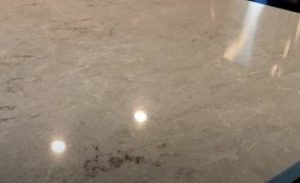
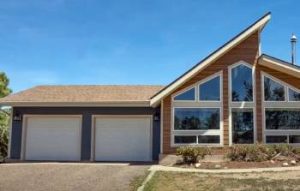
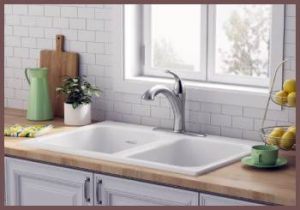
Clayton, thank you for this great review. I actually live in Alpharetta, GA – not that far from you! Where does one purchase Gaia around here? I have samples and like it. I’m a little worried about the locking mechanism. The samples I received basically chipped right off. Should I worry? We are putting these down on a slab. Herringbone and longboard. 1600sq’
Thanks again!
L
Can Gaia be installed on sound board 1/2 inch in 2nd story